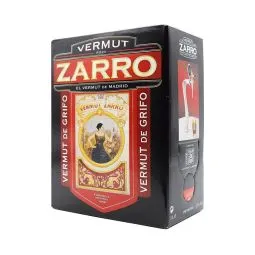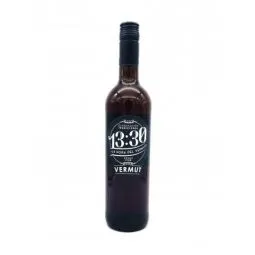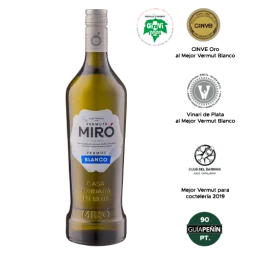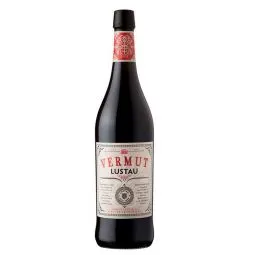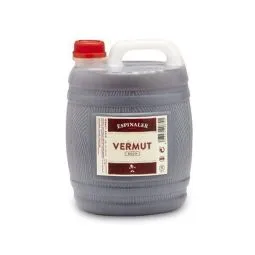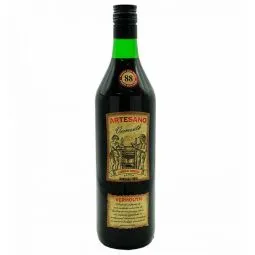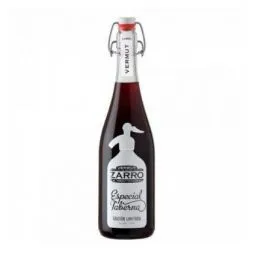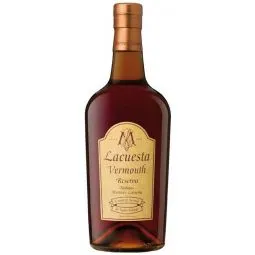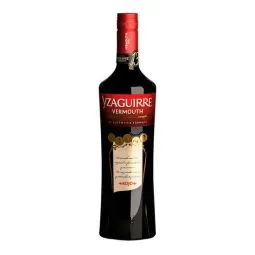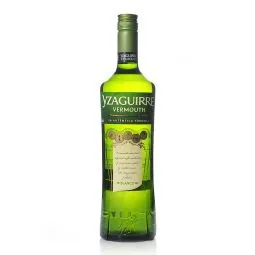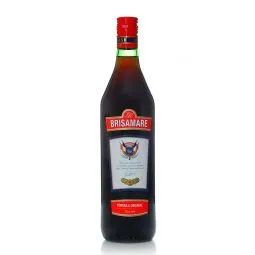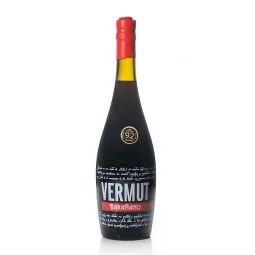15% HOT DISHES until:
BUY SPANISH VERMUT ONLINE AT A GOOD PRICE
Gastronomic Spain offers you the largest variety of Spanish Vermut with FREE shipping throughout Europe. We encourage you to buy Spanish vermouth online at a good price. The Spanish vermouth that we offer you is of high quality and very difficult to find outside of Spain. With a single click you can enjoy the best vermouth of Spain in any corner of Europe.
See moreUse our advanced search
PRODUCT BIO
BRAND
Vermut 13:30
Vermut White Miró
Vermut Lustau Red
Espinaler Red Vermouth
Vermut Artesano Red
Vermouth Zarro Especial Taberna
Vermut Red Lacuesta
Red Vermouth Yzaguirre
Yzaguirre White Vermouth
Red Vermouth Brisamare
Red Vermouth Barañano
Offer of good priced Spanish vermouth
At Gastronomic Spain we offer a great variety of Spanish vermouth with Free shipping to whole Europe
If you love vermouth and you don’t hesitate to have a vermouth with friends all the time then Gastronomic Spain is the online shop you were looking for.
In our online shop you may find a great variety of good priced Spanish vermouths with Free shipping to whole Europe. We also offer as well all those snacks and Spanish dishes that are needed when having a good vermouth.
What is the Spanish vermouth?
The Spanish vermouth is an alcoholic beverage made mainly of wine and wormwood. Besides those two fundamental ingredients others of the botanical type can be added to the mix. This drink has an alcoholic strength of the 15%, which means that is “stronger” than the traditional wine.
The origin of the vermouth
The vermouth has its origin in Italy, it was first made at the end of the 18th century and since the beginning it was a popular drink among the population. It has had a great acceptance in the rest of the European countries and in each one of them the recipe has been interpreted differently.
The first Spanish area that started to make vermouth was Andalucía using in this beverage the Palomina grape or the Pedro Ximénez grape. Later it extended to other areas of Spain such as Cataluña, País Vasco and La Rioja.
What ingredients are used to make a good Spanish vermouth?
The main ingredients used to make vermouth are: wine, aromatic and botanical herbs, hydroalcoholic solution (water and alcohol) and sugar. Now we will explain them with more detail.
• Wine
The wine that tends to be used to make this drink is characterised for being a quality wine considered neutral regarding flavour and smell, normally is a white wine with an alcoholic strength of 12°.
On a general basis and according to the official rules the wine is at least the 75% of this liquor. In the Spanish vermouths the grape used is the one of the areas as it can be the one of the Viura variety, the Maccabean or the Parellada when the vermouth is made in northern Spain. If the vermouth is made in the Andalusian region the grape used tends to be the Palomino or the Pedro Ximénez.
This wine will be the base of the drink to which different ingredients will be added to give it the oenologist’s personal touch. For this reason, it is necessary that the wine is a young one with a good constitution. The ageing and ripening will take place after the ingredients have been integrated, that is why using a crianza or reserva wine is not worth it.
There is no fixed vermouth recipe, there are wineries that even use the must of the alcoholic ripening of the wine or even some mistelle. This makes the Spanish vermouth to have more character.
• Aromatic herbs
The aromatic or botanical herbs are the ones that will give personality and its characteristic flavour to the Spanish vermouth. From all the aromatic herbs there is one that is essential when making vermouth: the wormwood, which will provide the vermouth of its characteristic sourness.
Depending on the type of aromatic or botanical herb used the vermouths can be classified as:
- Sour: the most used ones are: cardamom, hop and quinine
- Aromatic: citrus fruits such as lemon, pomelo and orange peel, anises, vanilla; aromatic herbs such as thyme, rosemary and lavender
- Sour-aromatic: wormwood (essential), veronica, lavender
One of the factors that will mark the aroma and taste of this beverage is the quality of the used aromatic herbs, their freshness and the proportion used in the mix. It needs to be taken into account that there are vermouths that have even 100 different aromatic and botanical herbs, the presence and proportion of these is necessary to get the flavour right.
• Hydroalcoholic solution, Water and Alcohol
The hydroalcoholic solution used in the making of the vermouth is a mix made with 50% alcohol and 50% water. In that solution is where the botanic herbs will be used in order to get their smells and slight touches.
• Sugar
The most consumed vermouth in Spain is the red vermouth. This colour is no indication of this drink being made with red wine, although there are occasions in which it is the case, most times that red or even black colour is due to the addition of caramelised sugar to the recipe. A distinction between syrup and caramel. Many alcoholic drinks are made with syrup, which is a transparent solution of water and white sugar. Whereas the caramelised sugar is the result of cooking sugar with a little bit of water, for it not to burn, over a heating source. The colour of the caramel is going to be determined by the concentration of water and the time that it has been cooked.
Depending on the amount of sugar per litre used in the recipe we will differentiate various categories of Spanish vermouth:
- Extra-Dry: the amount of sugar per litre is no more than 30gr
- Dry: it is considered dry vermouth when the concentration of sugar is between 30-50 gr
- Semi-Dry: the semi-dry vermouths are those that have between 50-90 gr of sugar per litre
- Semi-Sweet: a semi-sweet vermouth is that that has between 90-130 gr of sugar per litre
- Sweet: the sweet vermouths are those with more than 130 gr of sugar per litre
Wormwood: what it is and what adds to the Spanish vermouth?
The wormwood is an essential aromatic herb when making this liquor. It is native from Latin America, although it is also growth in some regions of Europe. It’s characterised by adding a sour taste and having properties that help digestion.
How is the Spanish vermouth made?
The process of making of the Spanish vermouth consists in various steps that now we will explain. It is important to remember that the classical recipe of the Spanish vermouth needs around 50 botanic herbs, so the steps described now is a general description of how vermouth is made, not a recipe nor a closed chemical formula.
• Wine selection
Depending on the wine of choice this will shine more or less over the botanic herbs that will be infused. On a general basis the chosen wine should be a good quality, young white wine with a neutral flavour with no marked taste shades.
• Maceration of the botanicals
Once the wormwood is cleaned and the botanic herbs have been selected, they need to be submerged is a hydroalcoholic solution that has been previously prepared mixing water and alcohol in equal parts. During this process the aromas, flavours and shades of the selected aromatic herbs are extracted. The maceration period and the chosen botanic herbs will determine the degree of sourness and the aromatisation of the vermouth.
This process can take days, weeks or even months. In occasions oak barrels, normally used to store wine and other liquors are used to give a bit of wood taste to the liquor.
• Mixture and assemblance of the vermouth
Once finished the maceration period the resulted liquid need to be filtered and later added to the previously chosen wine. After adding the maceration of the botanic and aromatic herbs the previously caramelised sugar is added, which will give the drink that dark touch. Once mixed all the beverage is left resting for all the ingredients to homogenously mix.
The result will be a beverage with a alcoholic strength between 15-25%, with a 75% of white wine and a 25% of hydroalcoholic solution of botanic herbs maceration, aromatic herbs and caramelised sugar.
Characteristics of the Spanish vermouth
After knowing the ingredients that make this beverage the main characteristics of the vermouth can be indicated:
• The contrast between sweet and sour. The sweetness added by the caramelised sugar and the sourness of the aromatic and botanical herbs.
• It is a spiced and aromatised drink with a great amount of subtle differences
• It is a versatile drink, it can be taken on its own, mixed with another drink or mixed as a cocktail
• It a drink that helps digestion
Differences between the white vermouth and the red vermouth
Visually, one may think that difference between the red vermouth and the white vermouth is the type of grape used in them which provides the drink with one colour or another.
The real difference between these two types of vermouth lies in the fact that caramel is added to the red vermouth which gives it that dark colour and makes the drink sweeter.
Types of Spanish vermouth one can find at Gastronomic Spain
At Gastronomic Spain you may find all sorts of Spanish vermouth, the most popular ones are the red or black vermouth and the white vermouth. Nevertheless, due to the wide offer of vermouth we offer we even have an orange vermouth.
Although it is true that we have vermouth from all regions of Spain, I would like to highlight some of the most popular Spanish vermouths that you may find in our online shop.
Zarro Vermouth
It is the vermouth from Madrid, the traditional one. It has great range of qualities and formats. In our website you can find:
• Ecological Zarro Vermouth
• 3 litre Zarro Vermouth
• Tabern Zarro Vermouth
Yzaguirre Vermouth
The Yzaguirre vermouth is the most commercial one, is the one of Cataluña and the north of Spain. In our website you can find:
• White Yzaguirre Vermouth
• Red Yzaguirre Vermouth
